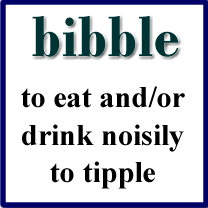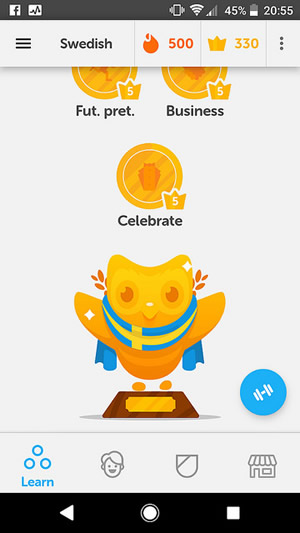
Here’s a recording in a mystery language.
Can you identify the language, and do you know where it’s spoken?

Here’s a recording in a mystery language.
Can you identify the language, and do you know where it’s spoken?

To plug away at something means “to move or work doggedly and persistently” [source] or “to continue doing something even though it is difficult or boring” [source], as in “He kept plugging away at his Russian, even though he didn’t seem to be making much progress.”
I learnt this week that there is a similar expression in Swedish – att plugga – which means “to study, to bone up, to cram, to grind” [source], and also “to plug, to stop with a plug; to read up, to study intensively, as in preparing for a test; to promote”, as in to plug a book [source].
In my Swedish lessons, att plugga is defined as meaning “to study (anywhere, informal)”, while att studera means “to study (at university, formal)” [source].
According to the bab.la dictionary however, it seems that att plugga can also be used to refer to university studies.
For example:
att studera is defined as “to study, to do, to examine, to get up, to pore” [source]. It can also mean “to investigate” [source].
Is studera used in more formal language than plugga?
Is there a Swedish equivalent of ‘Keep plugging away’?
There are various ways to say you’re studying something in English as well. If you’re at a university in the UK, you might say “I’m studying Quantum Knitting”, or “I’m doing a degree in Basket Weaving”. Students Oxford or Cambridge Universities might say “I’m reading Toffology”. What about elsewhere?

I came across a wonderful word yesterday – bibble – which means to eat and/or drink noisily, or to tipple. Or in Yiddish it means to worry.
It comes from the Middle English bibben (to drink), from the Latin bibō (I drink), from Proto-Indo-European *peh₃- (to drink) [source].
If you’re a bibbling bibbler, you may need a bib, which comes from the same root, and originally meant to drink heartily [source]. While bibbling, maybe you’ll engage in some bibble-babble (idle talk, babble), possibly in a bibbery (drinking house), which would be bibacious.
The words imbibe, potion and potable come from the same root, as do words for to drink in various languaages, including: ól (Irish), òl (Scottish Gaelic), yfed (Welsh), eva (Cornish), boire (French), and beber (Spanish, Portuguese, Galician, Asturian & Aragonese).
Words for beer Slavic languages come from the same root as well: pivo (Croatian, Czech, Slovak & Slovenian), piwo (Polish, Sorbian), and пиво (Russian, Ukrainian, Bulgarian, Macedonian & Serbian).

Yesterday I finally worked out how to create musical scores on my computer (using musescore). It’s something I’ve tried before, but couldn’t get the hang of. So now I’m going write out all the tunes I’ve composed. As I’m doing this, I thought I’d look into the names of some musical notes and their origins.
The commonly-used types of musical notes are shown in the image. Their names are different in British English and American English. The American English names are self-explanatory, and a bit boring. The British English ones are more interesting, so let’s look at where they come from:
A semiquaver is half the length of a quaver, and a demisemiquaver is half the length of a semiquaver. Shorter, and less commonly-used notes include:
Sources: Wikipedia, Wiktionary, Online Etymology Dictionary

Here’s a recording in a mystery language.
Can you identify the language, and do you know where it’s spoken?
What is the connection between singing and hens?
Hens don’t sing, but the words for to sing / speak in Celtic languages come from the same root as the English words hen and chant.
The root is the Proto-Indo-European *keh₂n- (to sing) [source].
This became *kan- (to sing) in Proto-Celtic, which became canaid (to sing) in Old Irish, and can (to chant, sing, speak, talk) in modern Irish. In Scottish Gaelic it became can (to sing, rehearse, say, name or call), and in Manx it became caayn (to bray, whine; song).
In Proto-Brythonic it became *kėnɨd (to sing), which became canam (to sing) in Old Welsh, canu (to sing, intone, chant, state, say) in modern Welsh, kana (to sing) in Cornish, canaff (to sing) in Middle Breton and kanañ (to sing) in Breton [source].
In Proto-Germanic *keh₂n- became *hanô (rooster), *hanjō (hen) and *hōnaz (fowl). The English word hen developed from *hanjō, via the Old English hænn / henn (hen). In other Germanic languages these words became: Huhn (hen, chicken) and Henne (hen) in German; hen (hen) in Dutch [source]; and höna (hen) in Swedish [source].
*keh₂n- is also the root of the Latin canō (I sing), from which words for to sing in Romance language developed, such as chanter (to sing) in French and cantar (to sing) in Spanish [source], and the English word chant [source].
See also the Celtiadur

Today my streak on Duolingo reached 500 days. Before then I had a 96 day streak, but lost that one day when I didn’t quite get enough points. So for the past 596 days I have studied a bit of various languages every day. This is the longest continuous period of study I’ve managed, and I plan to maintain it for as long as possible.
Back in early 2017 I started studying Swedish and Russian on Duolingo. Later I added Romanian to the mix, and this year I added Danish and Esperanto. I’ve finished all the Swedish and Russian lessons, and am continuing to study them on Memrise. I decided to take a break from the Romanian last year, and am currently working on Danish and Esperanto. When I finish them I may add other languages I want to improve, such as Spanish, Italian, Portuguese and German.
I can’t say that I’ve become fluent in any of these languages, but my knowledge of them certainly has improved. I’ve made more progress with Swedish and Danish than with Russian or Romanian, which I find more challenging.
On Memrise I’m currently studying Swedish, Danish, Russian and Cornish, and have learnt bits of Icelandic, Slovak and Slovenian over the past year or so. I may start Slovak again in preparation for the Polyglot Gathering in Bratislava next year.
What’s your longest streak on Duolingo, or other language learning apps?
What do you think of this aspect of such apps?

Here’s a recording in a mystery language.
Can you identify the language, and do you know where it’s spoken?
Recently I learnt the Russian word вместо [ˈvmʲestə], which means instead of or in place of. It is very similar to вместе [ˈvmʲesʲtʲe], which means together or along with. This got me wondering whether these words come from the same root.
вместо comes from в (in) место (place) [source].
вместе comes from въ мѣстѣ, from въ мѣстѣхъ, from мѣсто (place; field; square; settlement) [source].
So it seems that they are related, if I’ve understood the etymologies correctly.
Here are some examples and related words include:
– Ну… вы собрали вместе интересных подчиненных. = Well, it’s an interesting group of employees you’ve put together here.
– пошли в театр вместо концерта = let’s go to the theatre instead of the concert
– вместо того чтобы критиковать, постарайтесь понять. = try and understand instead of just criticizing.
– Тогда, по крайней мере, мы могли бы быть вместе вместо того, что имеем. = Then at least we could be together instead of whatever this is.
– вместе с тем = at the same time
– вместить = to hold, to accommodate, to fit sth/sb in
– вместиться = to fit in
– вместительный = spacious

What is the connection between frown, nose and nostrils?
The English word frown comes from the Middle English frounen (to frown as an expression of disapproval, displeasure, shame, fear, or jealousy), from the Old French frognier (to frown or scowl), from Gaulish *frognā (nostril), from the Proto-Celtic *srognā, from the Proto-Indo-European *sregʰ- (snore) [source].
The Proto-Celtic word *srognā is the root of the following words in the modern Celtic languages:
I’m not sure if the Cornish word frig comes from the same root, but it seems likely.
The French word renfrogner (to scowl), the Galician word enfurruñar (to frown, to get angry), the Spanish word enfurruñarse (to get angry, get cross, to sulk, to cloud over) also come from the same root.
Sources: Wiktionary, Am Faclair Beag, Online Manx Dictionary, Teanglann.ie, Geiriadur Prifysgol Cymru, Gerlyver Kernewek, Dictionnaire Favereau, Reverso
This is one of the connections I found recently while working on the Celtiadur, my collection of Celtic cognates.